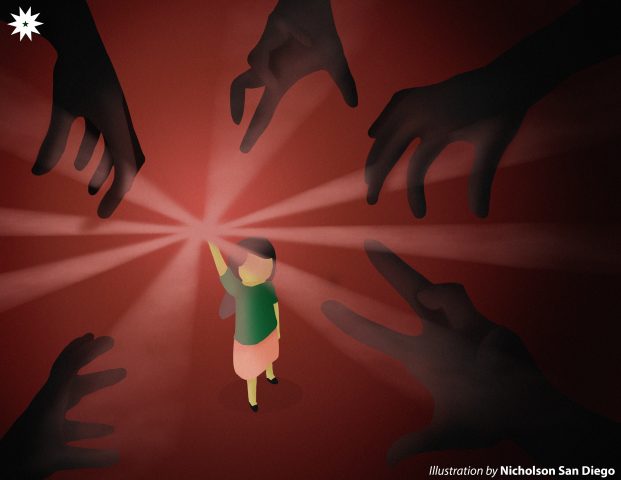With recent sexual harassment cases being brought to the public eye through social media platforms, developments in the national arena are looking to shift the way these cases are handled.
Signed into law last April 17, Republic Act 11313, also known as the Safe Spaces Act, sets in place penalties for acts of sexual harassment in public spaces. Principal author Sen. Risa Hontiveros called it a “massive victory” against “bastos culture” in the country as even lawmakers in the Senate were against the idea of safe spaces—Senate President Vicente Sotto III was notably lambasted when the law was being deliberated in 2018, after claiming that the Act only penalized “gender-based” harassment.
A concern of safety
For the University Student Government (USG), the Safe Spaces Act has become a priority, leading to the formation of its Safe Spaces initiative. Incumbent USG President Lance Dela Cruz and FAST2018 Legislative Assembly (LA) Representative Maegan Ragudo both made pronouncements in their campaigns during last term’s General Elections 2019 to ensure that the University becomes a safe space for all.
In an interview with The LaSallian, Ragudo, who is also Majority Floor Leader of the LA, reiterates the USG’s stance, “We will be lobbying for a strengthened Anti-Sexual Harassment and Discrimination (ASH+D) policy.”
Alongside the policy wing of the Office of the President (OPRES), Ragudo explains that the ASH+D policy aims to improve the University’s handling of harassment and discrimination cases. Included in this plan is the establishment of an office that will collaborate with University administrators to streamline the reporting of such cases, Ragudo discloses.
“Safety is more than just ensuring students are not in immediate harm,” stresses OPRES Chief Policy Advisor Marina Lim. Apart from physical security, Lim explains that safety also stems from respecting other persons, adding that safety is when “no one experiences or is at threat of harassment on the basis of their identity.”
In her five years in DLSU, Lim reveals that she has experienced her fair share of inappropriate behavior, even inside the classroom. From rape jokes to sexist remarks, Lim has witnessed these coming from both faculty and fellow students.
To make matters worse, she laments, the people who deliver these statements “may not even be aware of what’s wrong with their thinking.”
These experiences thus offer additional reasons for Lim to support the OPRES’ call for a policy that can “institutionalize [the] collective stance” of the student body on harassment and discrimination.
Lim also hopes that, in the process of passing the ASH+D policy, the move could “gradually shape the culture and norms [inside the University] to be more inclusive and progressive.”

Pushing the agenda
Under the Safe Spaces Act, individuals caught committing any form of sexual harassment may be subjected to a fine ranging from P1,000 to P100,000 and community service or imprisonment ranging from six days to six months, depending on the severity of the offense. Online offenses are also covered by the new law.
Ragudo shares her hope that the USG is given the chance to create policies for DLSU that are in line with the said law, ensuring improved handling of student grievances. Additionally, she aims to ensure that the ASH+D policy’s provisions will be “pro-student” in that the student body will be encouraged to “make DLSU a safer place for all” and hold perpetrators accountable for their crimes.
Explaining the initial objectives of OPRES for the ASH+D policy, Ragudo expounds that they intend to consult with the student body regarding harassment cases. The policy will also include a set of guidelines covering different forms of harassment and discrimination, which will be drafted with the help and approval of the LA and the Council of Student Organizations.
They are also looking to work with various University offices, such as the Office of Student Leadership Involvement, Formation and Empowerment; the Office of Student Affairs; the Student Discipline Formation Office; the Office of Counseling and Career Services; and the Office of the Legal Counsel in drafting guidelines.
“The goal of the new policy [that] we’re lobbying for is to establish an Office for Anti-Sexual Harassment,” Ragudo emphasizes.
The planned “centralized office” would be the culmination of the collaborative efforts between the USG and administrative offices, and would “serve as the sole body who will handle ASH+D cases within the University.”
Dela Cruz also disclosed in a previous interview with The LaSallian that his administration has plans to lobby for the installation of new surveillance cameras around University premises.
Speaking out
Yet even with such policies in place to address harassment and discrimination—including the USG’s efforts to make DLSU safer for the student body—Lim stresses that the ASH+D policy can still fail if it does not garner support and involvement from the students. “One of the main concerns is getting students to report such cases,” she explains.
Ragudo similarly acknowledges that the mere filing of a complaint can already prove difficult for victims. “Most ASH+D cases don’t get reported due to lack of proper knowledge on filing grievances and the lack of approachable avenues to do so,” she explains.
Lim, meanwhile, expounds that in some cases, victims may be criticized for proceeding with a case, while authorities could also potentially question the legitimacy of the claims. “We all know that filing a case, especially regarding sexual harassment, is such an intrusive process,” she says. However, given that the policy’s evaluation of cases has to be based on facts, she also recognizes that, “It is admittedly difficult to ensure that we minimize the intrusion [experienced by the student] of filing a case.”
Planning to make the reporting process as approachable and accessible for students, Lim hopes that it encourages students to speak out on their cases. Even though she admits that students may find it difficult to come forward, she nevertheless states that the option to obtain the justice they deserve will always be open to them
